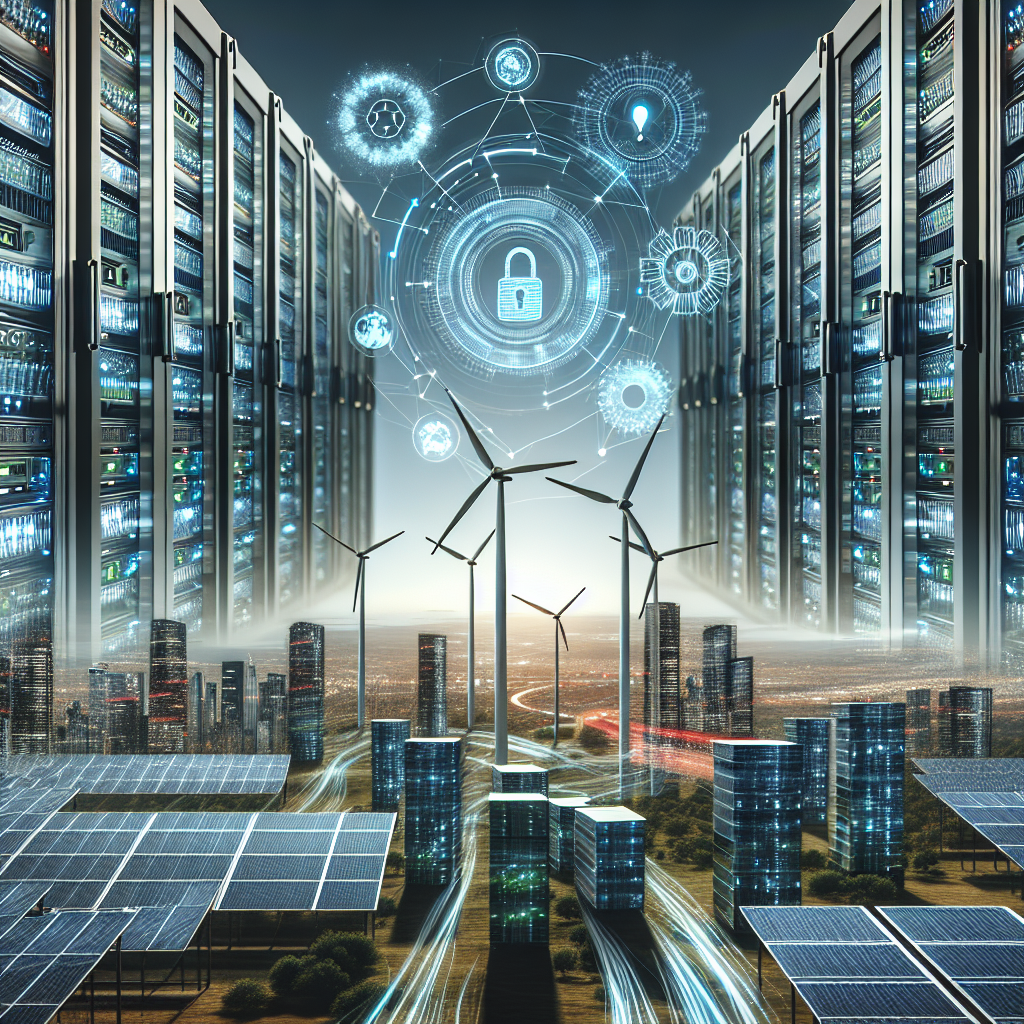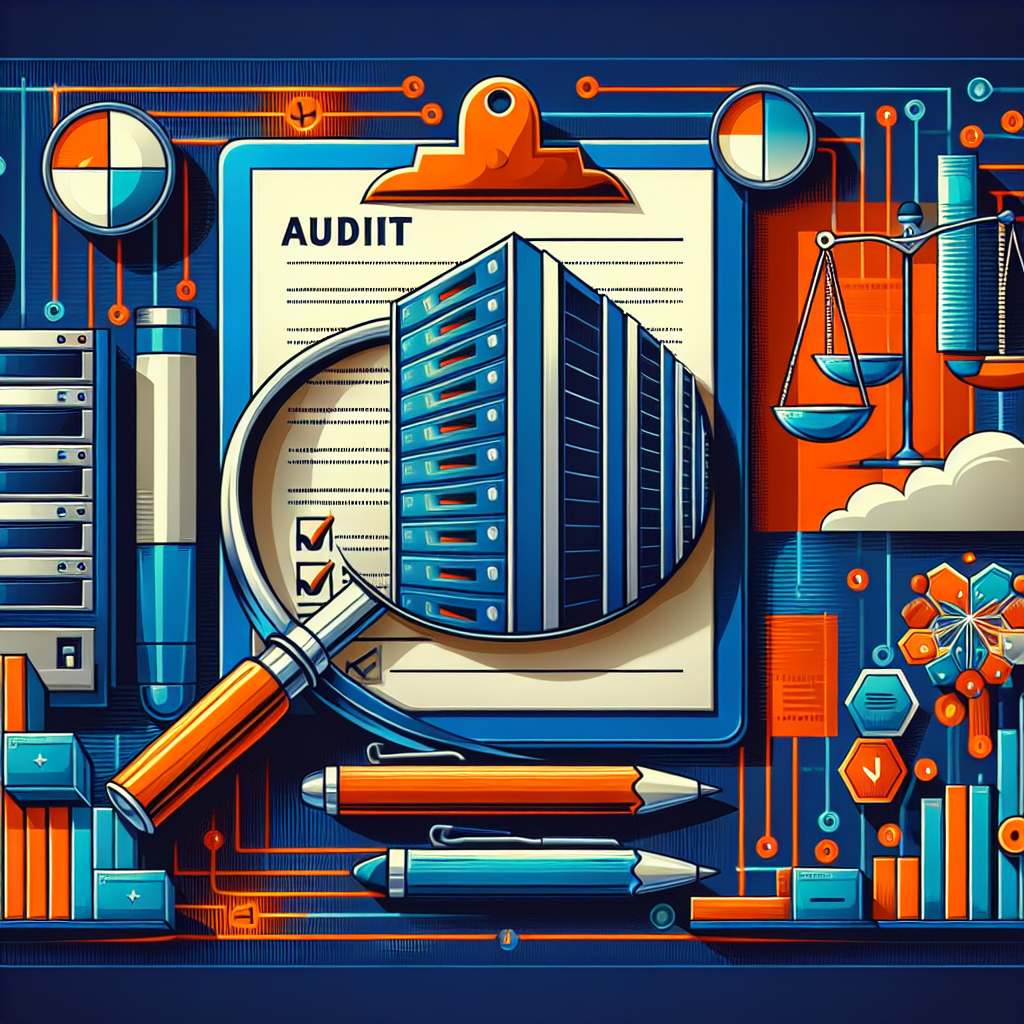Your cart is currently empty!
Tag: Regulatory

Future Trends in Data Center Compliance and Regulatory Requirements
Data centers have always been subject to stringent compliance and regulatory requirements due to the sensitive nature of the data they house. With the increasing amount of data being generated and stored, as well as the rise of new technologies such as artificial intelligence and the Internet of Things, the future of data center compliance and regulatory requirements is constantly evolving.One of the major trends in data center compliance is the increasing focus on data privacy and protection. With the implementation of regulations such as the General Data Protection Regulation (GDPR) in Europe and the California Consumer Privacy Act (CCPA) in the United States, data centers are under more pressure than ever to ensure the security and privacy of the data they process.
Another trend in data center compliance is the growing emphasis on environmental sustainability. As data centers consume a significant amount of energy, there is a push for them to become more energy-efficient and environmentally friendly. This includes using renewable energy sources, implementing energy-efficient cooling systems, and reducing overall energy consumption.
Additionally, data centers are also facing increased scrutiny from regulatory bodies around the world. Governments are imposing stricter regulations on data centers to ensure they are operating in a secure and compliant manner. This includes regular audits, inspections, and penalties for non-compliance.
In response to these trends, data center operators are investing in technologies and processes to ensure they are meeting compliance and regulatory requirements. This includes implementing advanced security measures such as encryption, access controls, and monitoring systems to protect data from breaches and unauthorized access.
Furthermore, data centers are also adopting automation and artificial intelligence technologies to streamline compliance processes and ensure they are meeting regulatory requirements in a timely and efficient manner. This includes automating compliance audits, generating reports, and implementing real-time monitoring and alerting systems.
Overall, the future of data center compliance and regulatory requirements is constantly evolving as new technologies and regulations emerge. Data center operators must stay ahead of these trends and invest in the necessary resources to ensure they are meeting compliance standards and protecting the data they manage. By staying informed and proactive, data centers can navigate the complex regulatory landscape and ensure the security and privacy of the data they house.

The Telecommunications Act of 1996: The “Costs” of Managed Competition: The Costs of Managed Competition (Topics in Regulatory Economics and Policy)
Price: $105.23
(as of Nov 28,2024 06:54:02 UTC – Details)
Publisher : Springer; Softcover reprint of the original 1st ed. 2000 edition (November 2, 2012)
Language : English
Paperback : 138 pages
ISBN-10 : 1461369371
ISBN-13 : 978-1461369370
Item Weight : 7.5 ounces
Dimensions : 6.1 x 0.33 x 9.25 inches
The Telecommunications Act of 1996 was a landmark piece of legislation that aimed to promote competition in the telecommunications industry and spur innovation and investment. One of the key provisions of the Act was the introduction of managed competition, which sought to balance the interests of consumers and competitors while also ensuring the continued growth and development of the industry.However, while managed competition was intended to lower prices for consumers and increase choice and quality of services, it also came with its own set of costs and challenges. In the book “The Costs of Managed Competition (Topics in Regulatory Economics and Policy),” authors delve into the various economic, regulatory, and policy implications of managed competition in the telecommunications industry.
From the costs of implementing and maintaining a competitive marketplace to the potential for market manipulation and anti-competitive behavior, the authors explore the complexities and trade-offs inherent in managed competition. They also examine the role of regulators in overseeing and enforcing competition rules, as well as the impact of technological advancements and changing consumer preferences on the industry.
Overall, “The Costs of Managed Competition” provides a comprehensive analysis of the challenges and opportunities presented by managed competition in the telecommunications sector, offering valuable insights for policymakers, industry stakeholders, and researchers alike.
#Telecommunications #Act #Costs #Managed #Competition #Costs #Managed #Competition #Topics #Regulatory #Economics #Policy
The Role of Data Center Audits in Meeting Regulatory Requirements and Industry Standards
In today’s digital age, data centers play a crucial role in storing and managing vast amounts of information for businesses and organizations. With the increasing importance of data security and privacy, it has become essential for data centers to comply with regulatory requirements and industry standards to ensure the protection of sensitive data.One of the key tools in achieving compliance is through regular data center audits. These audits are conducted by independent third-party organizations to assess the security, reliability, and efficiency of a data center’s operations. By conducting audits, data centers can identify potential vulnerabilities and gaps in their systems and processes, and take necessary steps to address them.
Data center audits play a crucial role in meeting regulatory requirements such as the General Data Protection Regulation (GDPR), the Health Insurance Portability and Accountability Act (HIPAA), and the Payment Card Industry Data Security Standard (PCI DSS). These regulations require organizations to implement strict security measures to protect sensitive data and ensure compliance with data protection laws.
Audits also help data centers adhere to industry standards such as the International Organization for Standardization (ISO) 27001, which sets out the requirements for establishing, implementing, maintaining, and continually improving an information security management system. Compliance with these standards demonstrates a data center’s commitment to maintaining high levels of security and reliability in their operations.
In addition to meeting regulatory requirements and industry standards, data center audits also help organizations improve their overall security posture. By identifying weaknesses and areas for improvement, data centers can implement best practices and security controls to enhance their security measures and protect against potential cyber threats.
Furthermore, data center audits provide assurance to customers and stakeholders that their data is being handled securely and in compliance with relevant regulations. This can help build trust and confidence in the data center’s services, leading to stronger relationships with clients and partners.
Overall, the role of data center audits in meeting regulatory requirements and industry standards cannot be overstated. By conducting regular audits, data centers can ensure the security and reliability of their operations, demonstrate compliance with regulations and standards, and enhance their overall security posture. In today’s data-driven world, data center audits are essential for organizations looking to protect their sensitive information and maintain the trust of their customers.

The Role of Data Center Security Systems in Compliance and Regulatory Requirements
As technology continues to advance and businesses rely more heavily on data storage and processing, the importance of data center security systems cannot be overstated. Data centers house a vast amount of sensitive information, including customer data, financial records, and intellectual property. Ensuring the security of this data is crucial for maintaining trust with customers, protecting valuable assets, and complying with regulatory requirements.One of the key roles of data center security systems is to protect against unauthorized access. This includes physical security measures such as access control systems, surveillance cameras, and security guards, as well as cybersecurity measures like firewalls, encryption, and intrusion detection systems. By implementing these layers of security, data center operators can prevent unauthorized individuals from gaining access to sensitive information and minimize the risk of data breaches.
In addition to protecting against unauthorized access, data center security systems play a critical role in helping organizations comply with various regulatory requirements. Many industries, such as healthcare, finance, and government, are subject to strict regulations governing the handling and storage of sensitive data. For example, the Health Insurance Portability and Accountability Act (HIPAA) sets forth requirements for protecting patient health information, while the Payment Card Industry Data Security Standard (PCI DSS) outlines security standards for organizations that process credit card payments.
By implementing robust security systems, data center operators can demonstrate compliance with these regulations and avoid costly penalties for non-compliance. For example, a data breach that exposes sensitive customer information could result in fines, legal action, and damage to the organization’s reputation. By investing in state-of-the-art security systems, data center operators can mitigate these risks and demonstrate their commitment to protecting customer data.
Furthermore, data center security systems can also help organizations meet the requirements of international data protection laws, such as the General Data Protection Regulation (GDPR) in the European Union. The GDPR mandates that organizations implement appropriate security measures to protect personal data and requires data processors to adhere to strict data protection principles. By implementing comprehensive security systems, data center operators can ensure compliance with these regulations and build trust with customers who are increasingly concerned about data privacy.
In conclusion, data center security systems play a crucial role in protecting sensitive information, maintaining compliance with regulatory requirements, and safeguarding the reputation of organizations. By investing in robust security measures, data center operators can minimize the risk of data breaches, demonstrate compliance with industry regulations, and build trust with customers. As the volume of data continues to grow and cyber threats become more sophisticated, ensuring the security of data centers is essential for the long-term success of businesses in today’s digital world.

The Role of Data Center Audits in Meeting Regulatory Compliance Requirements
In today’s digital age, data centers play a crucial role in storing and managing vast amounts of data for organizations worldwide. With data breaches and cyber attacks on the rise, regulatory bodies have imposed strict guidelines and regulations to ensure the security and privacy of sensitive information. As a result, data center audits have become an essential part of meeting regulatory compliance requirements.Data center audits involve a comprehensive review of the physical and technical security measures in place to protect data. This includes assessing the data center’s infrastructure, access controls, data encryption, disaster recovery plans, and compliance with regulations such as the General Data Protection Regulation (GDPR), Health Insurance Portability and Accountability Act (HIPAA), and Payment Card Industry Data Security Standard (PCI DSS).
By conducting regular audits, organizations can identify any potential vulnerabilities or gaps in their data center security practices and take corrective actions to mitigate risks. This not only helps in safeguarding sensitive information but also ensures compliance with regulatory requirements, avoiding hefty fines and reputational damage.
Audits also provide valuable insights into the overall effectiveness of the data center’s security posture. By reviewing audit reports and recommendations, organizations can make informed decisions on improving security protocols, implementing new technologies, and enhancing data protection measures to stay ahead of evolving threats.
Furthermore, data center audits help in building trust and credibility with customers, partners, and regulatory authorities. By demonstrating a commitment to data security and compliance, organizations can enhance their reputation and differentiate themselves from competitors in the marketplace.
In conclusion, data center audits play a vital role in meeting regulatory compliance requirements and ensuring the security of sensitive information. By conducting regular audits, organizations can identify and address security gaps, enhance data protection measures, and demonstrate a commitment to compliance and data security. Ultimately, data center audits are essential for safeguarding data, building trust with stakeholders, and maintaining a strong security posture in today’s increasingly digital world.

Remote Monitoring: A Key Tool for Ensuring Compliance and Regulatory Requirements
In today’s fast-paced and ever-changing business environment, ensuring compliance with regulatory requirements is more important than ever. Failure to comply with regulations can result in hefty fines, legal liabilities, and damage to a company’s reputation. As a result, many businesses are turning to remote monitoring as a key tool for ensuring compliance and meeting regulatory requirements.Remote monitoring involves the use of technology to track and monitor various aspects of a business’s operations from a distance. This can include monitoring equipment performance, environmental conditions, employee behavior, and more. By using remote monitoring, businesses can stay on top of regulatory requirements and ensure that they are meeting all necessary standards.
One of the key benefits of remote monitoring is its ability to provide real-time data and alerts. This means that businesses can quickly identify any issues or potential compliance violations and take immediate action to address them. For example, if a piece of equipment is not operating within the required parameters, remote monitoring can alert the appropriate personnel so that they can take corrective action before any regulatory violations occur.
Remote monitoring also allows businesses to track and document their compliance efforts. This can be crucial in the event of an audit or regulatory inspection, as businesses can provide detailed records of their monitoring activities and demonstrate their commitment to compliance. Additionally, remote monitoring can help businesses identify trends and patterns in their operations that may indicate potential compliance issues, allowing them to address these issues proactively.
Furthermore, remote monitoring can help businesses save time and resources by automating many compliance-related tasks. For example, instead of manually monitoring equipment performance or environmental conditions, businesses can use remote monitoring technology to do this automatically. This can free up employees to focus on other important tasks and ensure that compliance efforts are consistently maintained.
Overall, remote monitoring is a key tool for businesses looking to ensure compliance and meet regulatory requirements. By providing real-time data and alerts, tracking and documenting compliance efforts, and automating compliance-related tasks, remote monitoring can help businesses stay ahead of regulatory changes and avoid costly violations. As businesses continue to face increasing regulatory scrutiny, remote monitoring will become an essential tool for maintaining compliance and protecting their bottom line.

Data Center Safety Compliance: Meeting Regulatory Standards for a Secure Facility
Data centers play a crucial role in today’s digital world, serving as the backbone for storing, processing, and managing large amounts of data. With the increasing reliance on data centers, ensuring the safety and security of these facilities has become more important than ever. Meeting regulatory standards for a secure data center is essential to protect sensitive information and prevent potential risks.One of the key aspects of data center safety compliance is meeting regulatory standards set by government agencies and industry organizations. These standards are designed to ensure that data centers are equipped with the necessary security measures to safeguard against physical and cyber threats. Failure to comply with these standards can result in hefty fines, legal consequences, and reputational damage for the data center operator.
Some of the key regulatory standards that data centers must adhere to include the Payment Card Industry Data Security Standard (PCI DSS), the Health Insurance Portability and Accountability Act (HIPAA), and the General Data Protection Regulation (GDPR). These standards outline specific requirements for data center security, including access controls, physical security measures, data encryption, and incident response protocols.
To meet regulatory standards for a secure data center, operators must implement a comprehensive security strategy that addresses both physical and cyber threats. This includes conducting regular risk assessments, implementing access controls, monitoring network traffic, and implementing data encryption protocols. In addition, data center operators must have robust incident response plans in place to quickly identify and mitigate security breaches.
Physical security is also a critical component of data center safety compliance. Data centers house valuable equipment and sensitive information, making them a target for theft and vandalism. To prevent unauthorized access, data center operators must implement security measures such as surveillance cameras, access controls, biometric authentication, and security guards. Additionally, data centers should have fire suppression systems, temperature controls, and backup power sources to prevent downtime and data loss in the event of a disaster.
In conclusion, meeting regulatory standards for a secure data center is essential to protect sensitive information and prevent potential risks. Data center operators must adhere to industry standards and best practices to ensure the safety and security of their facilities. By implementing comprehensive security measures, conducting regular risk assessments, and having robust incident response plans in place, data center operators can create a secure environment for their customers’ data and maintain compliance with regulatory standards.

Ensuring Regulatory Compliance through Data Center Audits
In today’s digital age, data centers play a crucial role in storing and managing vast amounts of sensitive information. With the increasing number of regulations and compliance requirements, it has become more important than ever for organizations to ensure that their data centers are in compliance with industry standards and regulations.One way to ensure regulatory compliance is through regular data center audits. These audits involve a thorough examination of the data center’s infrastructure, policies, procedures, and security measures to ensure that they meet regulatory requirements. By conducting regular audits, organizations can identify any potential compliance issues and take corrective action before they escalate into serious violations.
There are several key areas that should be covered in a data center audit to ensure regulatory compliance. These include:
1. Physical security: A data center audit should assess the physical security measures in place to protect the facility from unauthorized access. This may include evaluating access controls, surveillance systems, and security protocols to ensure that sensitive information is protected from theft or tampering.
2. Data protection: Data center audits should also focus on the measures in place to protect data from breaches or unauthorized access. This may involve reviewing data encryption methods, backup procedures, and disaster recovery plans to ensure that data is secure and accessible in the event of a security incident.
3. Compliance with industry standards: Data center audits should also assess whether the facility is in compliance with industry standards and regulations, such as ISO 27001, HIPAA, or GDPR. By ensuring compliance with these standards, organizations can demonstrate their commitment to protecting sensitive information and avoiding costly penalties for non-compliance.
4. Documentation and reporting: A key component of data center audits is documenting findings and recommendations for corrective action. By maintaining thorough documentation of audit results, organizations can track their progress in addressing compliance issues and demonstrate their commitment to regulatory compliance.
In conclusion, ensuring regulatory compliance through data center audits is essential for organizations that store and manage sensitive information. By conducting regular audits and addressing any compliance issues that are identified, organizations can protect their data, avoid costly penalties, and demonstrate their commitment to security and compliance.

Best Practices for Achieving Data Center Compliance in a Complex Regulatory Landscape
In today’s digital age, data centers play a crucial role in storing and managing vast amounts of information for businesses and organizations. However, with the increasing amount of data being collected and stored, data center compliance has become a major concern for companies across various industries. The regulatory landscape is constantly evolving, with new laws and regulations being introduced to protect consumer data and ensure the security of sensitive information.Achieving data center compliance in a complex regulatory landscape can be a daunting task, but there are best practices that businesses can follow to ensure they are meeting all the necessary requirements. By implementing these best practices, companies can not only avoid costly fines and penalties but also build trust with their customers and stakeholders.
One of the first steps in achieving data center compliance is to identify and understand the relevant regulations that apply to your industry. This may include laws such as the General Data Protection Regulation (GDPR), the Health Insurance Portability and Accountability Act (HIPAA), or the Payment Card Industry Data Security Standard (PCI DSS). By having a clear understanding of these regulations, businesses can develop policies and procedures to ensure they are in compliance.
Another important best practice for achieving data center compliance is to regularly conduct risk assessments and audits of your data center operations. This will help identify any potential vulnerabilities or weaknesses in your security measures and allow you to take proactive steps to address them. By regularly reviewing and updating your security protocols, you can ensure that your data center is secure and compliant with regulations.
Implementing strong access controls is also essential for achieving data center compliance. By limiting access to sensitive information to only authorized personnel, businesses can reduce the risk of data breaches and ensure that data is being handled appropriately. This may include implementing multi-factor authentication, encryption, and monitoring access logs to track who is accessing data and when.
In addition to implementing strong security measures, businesses should also have a robust data governance program in place. This includes establishing policies and procedures for data handling, storage, and disposal, as well as conducting regular training for employees on data security best practices. By having a comprehensive data governance program, businesses can ensure that data is being handled in a compliant and secure manner.
Lastly, businesses should consider working with third-party vendors and partners who are also compliant with relevant regulations. This may include cloud service providers, data storage facilities, or IT security firms. By ensuring that all of your partners are also compliant with regulations, you can reduce the risk of non-compliance issues arising from third-party activities.
In conclusion, achieving data center compliance in a complex regulatory landscape requires a proactive approach and a commitment to implementing best practices. By staying informed about relevant regulations, conducting regular risk assessments, implementing strong access controls, establishing a data governance program, and working with compliant partners, businesses can ensure that their data center operations are secure and compliant with all applicable regulations. By prioritizing data center compliance, businesses can protect sensitive information, build trust with customers, and avoid costly penalties.

The Importance of Data Center Compliance in Today’s Regulatory Environment
In today’s highly regulated business environment, data center compliance has never been more important. With an increasing number of laws and regulations governing how companies handle and store sensitive information, organizations must ensure that their data centers are in compliance with all relevant requirements.Data center compliance refers to the set of rules and regulations that govern the management and security of data stored in a data center. These regulations are put in place to protect the privacy and security of individuals’ personal information, as well as to ensure that businesses are following best practices when it comes to data management.
One of the most significant reasons why data center compliance is so important is the increasing number of data breaches and cyber attacks that have occurred in recent years. These incidents have highlighted the importance of protecting sensitive information from unauthorized access and theft. By adhering to data center compliance regulations, companies can help prevent these types of breaches and protect their customers’ data.
Another reason why data center compliance is crucial is the potential legal and financial consequences of non-compliance. Failure to comply with data protection regulations can result in hefty fines, legal action, and damage to a company’s reputation. In some cases, non-compliance can even lead to the closure of a business. By ensuring that their data centers are compliant with all relevant regulations, organizations can avoid these negative outcomes and protect their bottom line.
Furthermore, data center compliance is essential for building trust with customers and stakeholders. In today’s digital age, consumers are more aware of the importance of data security and privacy. By demonstrating that they are complying with data protection regulations, companies can show their commitment to safeguarding their customers’ information and building trust with their audience.
To ensure data center compliance, organizations should regularly assess their data management practices and systems to ensure they are in line with relevant regulations. This may involve implementing encryption technologies, access controls, and data monitoring tools to protect sensitive information. Additionally, companies should stay informed about changes in data protection laws and update their data center practices accordingly.
In conclusion, data center compliance is essential in today’s regulatory environment to protect sensitive information, avoid legal and financial consequences, and build trust with customers and stakeholders. By prioritizing data security and adhering to relevant regulations, organizations can safeguard their data and mitigate the risks associated with non-compliance.
